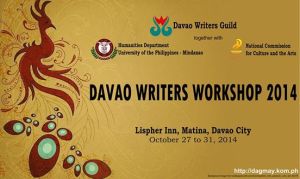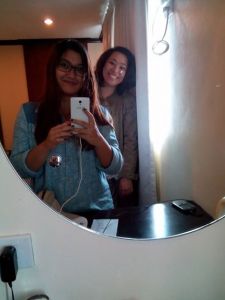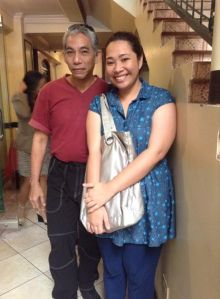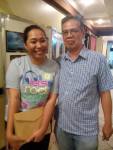
Ever since I travelled from Davao, I’ve been having hard time writing, not that it didn’t serve me well. On the contrary, the 2014 Davao Writers Workshop has taught me so much about the craft. It’s just that, with all the sound insights from the panelists as well as co-fellows, it was hard to choose which ones to take. Plus, I had a handful of projects on my mind, it was difficult to keep up and decide which ones to write first.
I’ve raved about being in the final list of fellows in the 2014 Davao Writers Workshop but I still haven’t blogged about my Davao experience. Abby even beat me to it.
So here’s my take on our Davao Writers Workshop experience. 
Trip to Davao
My trip to Davao was fraught with hang ups. For one, I’ve been having a hard time looking for someone to take care of my dad. The previous one had to go back to her hometown a week before the workshop. She had to leave because of health reasons. Good thing I talked our house help, Ate Dodong, into getting the job.
Second was the fact that I was practically dirt broke around the 3rd week of October. I usually get my paycheck on the 25th. But then it fell on a Saturday which means no money, no honey. Aside from that, my wallet was snatched by a rugby-sniffing kid around XU. Good thing I had my ATM card in my bag and not inside my wallet. That would’ve been a colossal screw up. So, I called in a few favors. Good thing they took pity on me.
On the night of the 26th of October, Abby and I met up at the Agora Bus Station. We were quite surprised that a crowd was already waiting for the next bus to Davao. We had to stand up for 20 minutes before it arrived. By the time it parked, all of us swarmed towards the bus.
I now have first-hand experience on how humans would behave when the zombie apocalypse comes.
We could’ve been on the bus that left at 10pm but we didn’t get the memo about virtual strangers getting hired to reserve seats for passengers. We even had to plow our way into the bus only to find out there were no seats left for us. That bummed us out.
It took Abby and I at least 2 hours to get ourselves on the bus to Davao. We even had to watch this cheesy show in TV5. It was another Wattpad story that got adapted into a TV show. I don’t remember the title but the most “profound” line that got stuck in my mind was “Mas pinili ko pa siya kesa sa online games.” (I chose her over online games.)
It was the last trip to Davao. At a quarter to twelve, it left the station. By the time it zigzagged through Puerto Heights and I saw the city lights from the pier to Macajalar Bay, I had this odd feeling of relief.
We were going to Davao for the first time. It was pretty daunting knowing that our amateur works were going to be scrutinized by the seasoned panelists. But we were also excited on the new things we were about to learn from the workshop.
I was in and out of sleep on the ride and there wasn’t much view to be seen from the window because it was practically dark out. But there was a time when I woke up and there was a fork up ahead. The sign said left for Davao and right for Kibawe. When I read it, I thought “Oh man, moment of truth.” The bus turned left.
At 5am on the 27th, the sun was going up. We reached this place where we had an impeccable view of the foggy mountains. The fog looked like a huge white lake. It was magnificent. (No photos. The view wasn’t on our side of the bus.)
Touchdown
We checked in at Lispher Inn at around 6am. When we got our things out of our bags and into the cabinet, we realized one thing. We were starving. The breakfast slip handed to us was only valid for the next day so we had to call Jollibee for delivery.
At 9am, Sir Julian dela Cerna, the workshop director, called us down. I must tell you. Sir Julian and I have been corresponding via text even before the workshop. He put his personal number on the email he sent the fellows. I had to tell him I had no IDs left on me because my wallet got snatched on the 25th. (Didn’t I tell you that earlier? It was one of those hang-ups I told you about.) I also asked for directions from the bus station to Lispher Inn. He suggested that we should just take a taxi to the inn. True enough; the place was pretty near from the station. The taxi only charged us 50php.
First day
When Abby and I got into the conference room, we were greeted with warm smiles from Sir Dom Cimafranca, who surprisingly commented on my post, and who I would eventually know as Sir Macario Tiu. Sir Dom even greeted us with an inside joke. I didn’t get it immediately (being in the bus for 6 hours does not make me the sharpest cookie in the block) but good thing Abby replied something witty.
The room was gaining crowd. Two groups of monoblock chairs were set up inside divided by an aisle. I noticed that the veterans were seated on the right side and the young guns on the left. There was a podium upfront. Behind it, the wall was covered with the official tarp of the 2014 Davao Writers Workshop. People who knew each other were already mingling. We seated ourselves at the back, near the water cooler. Most of them were virtually strangers but I noticed someone’s voice that stood out faintly but familiar.
Ma’am Jhoanna Cruz officially welcomed us to this year’s workshop. She acknowledged the presence of seasoned Davao Writers Guild members. The experience was so vivid. It felt like I had to know these people but then being the local literature dumb that I am, that hampered it. And then she nonchalantly mentioned Joey Ayala. Joey Ayala! I had to stop myself from squeaking like a hormone-raged teenager.
Then, Sir Julian was on the podium. He informed us of the statistics of applications sent for this year’s workshop. The demographic of applicants was spread throughout the Philippines. There was one from Diliman. I think there was even one from abroad. He also said there was a 40% drop of applicants. It may be attributed to the fact that UP Mindanao, whose student body is a steady source of applicant, changed its school year starting in August, also around the same time the deadline of applications was set. Out of 37 applicants, 14 were accepted as fellows. He introduced us by reading our bios. By the time he read mine, I stood up and a weird sense of pride came to me. I was representing CDO with Abby. I told myself I shouldn’t screw this up.
He then introduced the panelists for this year: Sir John, Bengan, Sir Nino de Veyra, Ma’am Jhoanna Cruz, Sir Macario Tiu, and Sir Nikki Gomez.
Sir John Bengan teaches writing and literature at UP Mindanao and took his MFA at The New School in New York City. His English short story “Armor” won 1st Prize for Short Story in English in the 2013 Don Carlos Palanca Memorial Awards for Literature.
Sir Nino de Veyra is BA Communication Arts graduate from the UP Visayas Tacloban College and took his MA in English at Silliman University. He is currently Assistant Professor of the College of Humanities and Social Sciences of UP Mindanao.
Ma’am Jhoanna Cruz is the President of the Davao Writers Guild. She also teaches writing and literature at UP Mindanao. Her play “Halakata, MS.D” won 2nd Prize for Full Length Play in English in the 1999 Don Carlos Palanca Memorial Awards for Literature.
Sir Mac Tiu is teaches Literature at the Ateneo de Davao University. His short story “Tsuru” won 1st Prize for Short Story in Cebuano in the 2008 Don Carlos Palanca Memorial Awards for Literature.
Sir Nikki Gomez is a journalist in Davao City. He is also a member of the Davao Writers Guild.
They have such awesome bios. All so accomplished in the literary industry.
Then, Sir John introduced the guest panelist for this year, Ma’am Daryll Delgado, the winner for the 2013 Outstanding Book Award for her book “As the Body Displaces Water.”
He gushed about how he met her in New York. He did pabaga’g dagway and introduced himself to her. After that, Ma’am Daryll went on the podium and said that she was also a fan of Sir John’s as well. It was so refreshing to witness such quick repartee by two distinguished writers. Made me see that the industry wasn’t as cut-throat as it seemed to be. (Side note: Abby and I shipped Sir John and Ma’am Daryll by then. Although Sir John told us he was gay on the third day, we still went on with this fantasy even after the workshop. We’re crazy like that. Haha. )
She then gave a lecture on Philippine Fantasy. She compared the fantasy writers from the 80s to the current ones. The fantasy writers from the 80s (who included Nick Joaquin), she noted, didn’t have precedents and somehow had a richer Filipino cultural texture. On the other hand, the more recent ones are very much influenced by Western, especially American, sensibilities.
I think it was her dissertation for her PhD. I’m not quite sure. I couldn’t focus because my brain wasn’t fully functioning well. If there’s an English word for being jetlagged on a bus, I’d have written it here.
(Nananawagan po ako kay Ma’am Daryll. Ma’am Daryll, if you’re reading this, I apologize for not paying attention to your lecture. Being bilar is not an excuse.)
After her lecture, we had our lunch break. Sir Julian even asked Abby and I to tell the other fellows about the first few works to be critiqued later that day. I think it was his way of making us break the ice. It kind of didn’t work. Not yet.
For this time of the workshop, the head panelist and moderator was Ma’am jho. The pieces that were critiqued that afternoon were written by fellows MJ Tumamac (Poetry), Arjay Viray (Short Story), Ria Valdez (Poetry), and Reil Obinque (Short Story).
That afternoon, the panelists gave their comments first before the fellows did. It was fascinating listening to them. They saw and made critical opinions about the details that lacked in the pieces but not without pointing out the good aspects of it.
Second day
By this time, we had the schedule and the compiled drafts handed to us. It was hardbound in blue leather with gold letters. We called it The Manual. My 2 poems were scheduled to be critiqued on the 29th and the 31st.
From the 28th to the 31st, the workshop started with a Craft Lecture given by one of the panelists followed by a snack break. Then, we proceeded to critique the scheduled pieces for the day; expected that we all have read the works from the manual beforehand.
For this day, we had Sir Mac discuss on “Effect” as his framework. He pointed out that the question “How would you want your readers to feel after reading your piece (happiness, nostalgia, sadness, grief, etc.)?” would become a point of reference, or a framework, when we write. All of the details we write should all aid to move the plot towards that effect. This framework doesn’t just apply to short stories but in creative writing in general.
The written works critiqued on the 28th were written by Neil Cervantes (Poetry), Resty Bhoy Partoza (Short Story), Hannah Valencerina (Poetry), and Jecia Anne Opiana (CNF).
This time, we fellows were the first ones to say our opinions about the pieces. We kind of got the rhythm of diagnosing the drafts from the example led by the panelist. It was a bit of a hit and miss for me because I never had any experience with literary critical frameworks before. So, I had the tendency of saying what I liked and pointing out confusing details about the pieces, but then, I never really any suggestions to improve the drafts.
Third day
On the 29th, Sir John opened the workshop with his lecture on translation and equivalency in writing Philippine fiction in the English language. He made use of Matthew Choate’s interview on him about his process in writing “Armor”.
Writing Philippine fiction in English is a tricky feat, I found out. Not only are we writing about our own Filipino culture, we also have to consider the audience, not just the Filipino readers, who will be able to read our works. When he was asked how he deals with the balance between information, background, and the rhythm of the story itself, he answered that he ultimately trusts his instincts. It takes finesse to write in details without coddling the foreign reader. In the end, “The Eurocentric reader will have to accept that there’s a world out there.”, he said.
This was the day my balak Proben and Abby’s short story were scheduled to be critiqued. The panelists and co-fellows were very thorough in diagnosing the drafts in the last couple of days.
It was pretty daunting to be under that amount of scrutiny but I felt relieved when most of the panelists and fellows received my poem well. I still have to work on it and have to put additional details to push the effect that I want to (using Sir Mac’s framework right there.) Sir Nino’s insights on it were very helpful to me. It made me figure out what sort of details to write on my next draft. (Side note: His Craft Lecture on Poetry will have an immense effect on me.)
Fourth day: “Ilabay sa Bankerohan River”
We began the 29th with a Craft Lecture from the Goddess, Jhoanna Cruz, on the basics of playwriting. She explained how playwriting is the least solipsistic medium in creative writing because it demands collaboration; from set design, to the director, to the actors, and the production staff. There are a lot of things to be considered, both in the literary and the production side.
In the literary aspect, you as a writer must create at least two well-defined characters (at least for a one act play). A well-defined character, simply put, is a fictional entity that has its own unique voice in the script. Character must be shown through dialogue. You have to consider how the physical, psychological, social, mental being of the character in order for that unique voice to come out of the script. Not only that, you must also show character through action. After that, you can write how the story goes.
“It’s a play. It is meant to be performed on a stage, in front of a live audience.”, she said.
It has been known in the closely knit literary circles in Mindanao that the phrase “Ilabay sa Bankerohan River” is Sir Mac Tiu’s signature line. The fellows and I have heard about this urban legend even before we got into the workshop. I thought it was incredulous that someone as soft spoken as he was would say such harsh words.
And then it happened. I won’t tell you which draft garnered this comment. On a brighter note, Sir Mac only wanted to get rid of a part of the draft and not throw the entire piece in the Bankerohan River.
Later that day, we found out our batch broke a record. It usually took Sir Mac the first two days of the workshop to utter such phrase. But with us, it took him four days. I guess it’s a sign that our batch will go farther in this field. Either that or he just had more patience with us. Haha. We will never know.
Fifth day
Sir Nino de Verya (not sure if related to Lourd) opened the day with his Craft Lecture on Texture in Poetry. He subtitled the lecture as “How not to write like Lang Leav” to make it controversial. He used Lang’s poem “First Love” and compared it to Elizabeth Bishop’s “The Fish” to show contrast. Lang’s poem used a familiar notion and added random imagery to support the idea. Elizabeth Bishop’s, on the other hand, vividly described the fish, as a subject, with all its detail. The description made the poem more visceral and captivating. The metaphor leaped out of the literal. The point? It had depth. It had texture.
I pretty much had to hide myself because I used to be a proud fan of Lang. Yes, the workshop changed me so much. I cannot read something without using any critical framework. It kind of sounds like I’m sort of renouncing my fandom on Lang and a bit of a literary snob. I’m not. Let’s just say that I outgrew her.
It was also the day my other balak Uniporme was critiqued. It was the last one to be under the microscope. I got a lot of insights from my co-fellows and the panelists. Like Probe, it made use of anthropomorphism as its framework. Thought, most of the panelist advised me to give it another twist. Make it not didactic and polemic. (Currently editing it as I type this.)
Fellows’ Night
After the workshop was done, the fellows and I prepared a show. It took us almost two nights to finish the program. We made co-fellows Arjay and Neil sing their own songs. Abby, Jecia, and I did an improv called Pick-up Lines. We literally had to pick up lines written on small pieces of paper. We also gave hashtag awards to the fellows and panelists. The night and the workshop was closed with so much laughter.
Thoughts after the workshop
For the distinguished panelists, thank you for giving us your full attention and patience. For you to read and critique our amateur works for five days was such an honor. You weren’t as harsh as I expected you to be. On the contrary, you were so nurturing towards us. Of course, you all did criticize our works regarding form, framework, conflict, and the basic issue of grammar, but all of you also praised us for our own unique voices.
Ma’am Daryll even told some of us fellows, in one of our conversations in the lobby, how she enjoys coming to the South whenever she can. She appreciates how writers like us here make use of our own hometowns as settings. Such trait gives our stories its own local color.
But we still have a long way to go. We have to work hard and improve on our craft, as what Sir Nikki always said.
I also owe my learning experience to my co-fellows, for being such wonderful companions and for being honest in critiquing each other’s works. Like what Ma’am Jho said in our Fellows’ Night, “You are responsible for each other’s growth in this process.”
At the end of it, I realized how writers have an integral part in forming the mindset of our society. We, as writers, have the responsibility to show our own culture in our own works. I know the Philippines isn’t the best place to live in, what with all the corruption and shit it has been going through, but I think we should display the ugly underbelly of our own country for what it really is and show our resilience as a people. It’s what makes us Filipino.






